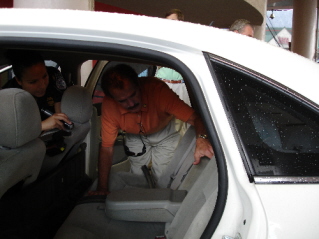The US Supreme Court ruled Monday that police officers have the right to frisk passengers in cars stopped for traffic offenses even if they have no evidence the passenger has committed a crime or is about to do so. The ruling marks the latest in a now long line of high court decisions since the end of the Warren court -- many of them in drug cases -- that have eroded the Fourth Amendment's proscription against warrantless searches.

The ruling came in Arizona v. Johnson, in which Lemon Johnson was the back seat passenger in a car pulled over by anti-gang police in Oro Valley. After questioning Johnson in the car and being informed that he was from "a place [the officer] knew was home to a Crips gang" and that he had served time for burglary, the officer, the officer asked him to get out of the car for further questioning. Noting also that Johnson wore a blue bandana and had a scanner in his pocket, the officer "patted him down for officer safety."
During the pat-down search, the officer found a pistol and a small bag of marijuana. Johnson was charged with weapons and drug possession offenses. He was convicted at trial, but that conviction was overturned by the appeals court, which held that although Johnson had been lawfully detained when police stopped the car for the traffic violation, during the course of the encounter before Johnson was frisked, the detention had "evolved into a separate, consensual encounter stemming from an unrelated investigation by [the officer] of Johnson's possible gang affiliation." Without "reason to believe Johnson was involved in criminal activity," the court ruled, the officer "had no right to pat him down for weapons, even if she had reason to suspect he was armed and dangerous."
That's not right, the Supreme Court said in a ruling authored by Justice Ruth Bader Ginsburg. Citing case law going back to Terry v. Ohio (1968), which established that police may constitutionally stop and interrogate people if they reasonably believe a crime has been or is about to be committed and that police can then frisk them to search for weapons, Ginsburg and the court ruled that such pat-down searches are allowable if police "harbor reasonable suspicion that a person subjected to the frisk is armed, and therefore dangerous to the safety of the police and public."
Comments
Goes without saying
Since the "patriot act", and "asset forfeiture", why is this even an issue?
You can be sitting in your living room watching TV, and "legally" the cops can bust in, unannounced, without a warrant, without probable cause, arrest you, without a charge, jail you indefinitely, without legal representation, without a speedy trial, take, your house, your car, your bank account, all your assets, auction off what they don't want, and until recently, torture you. I would say the terrorists are our own government, and since they've caused way more harm to America than Al-Quida ever could have dreamed. And the last sentence sums it all up "harbor reasonable suspicion", that's all that's required to completely destroy someones life, or even end it, LEGALLY. Saddam wasn't even that bad. How does the "law" define "terrorist regime"? And, whats the difference between a "democracy", and a "terrorist regime"? As in America right now.
Add new comment